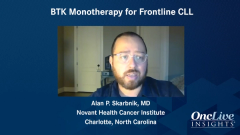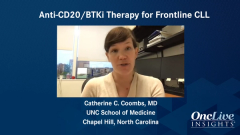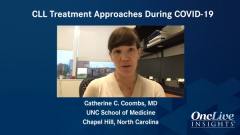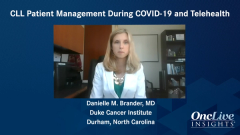
Frontline CLL: Treatment Algorithms
Episodes in this series

Danielle M. Brander, MD: In the frontline setting, the question of whether to choose a BTK [Bruton tyrosine kinase] inhibitor–based therapy or a venetoclax-based therapy becomes 1 of the longest and most challenging questions and counseling sessions for patients. We have these options available for patients, but as of today there’s no 1 clinical trial that randomizes and has long follow-up showing clear superiority of a BTK-based therapy vs a venetoclax-based therapy. Much of the data we take extrapolates from other frontline trials that have shown beneficial PFS [progression-free survival] of the monotherapy or combination with anti-CD20 of either BTK inhibitors vs chemotherapy or venetoclax-based regimens vs chemotherapy.
When you extrapolate for the superiority of the novel agents, and when talking to patients about BTK inhibitor vs venetoclax in the frontline setting, there are a couple of things to take into account. Tell them that it’s going to be a long conversation because in many cases there’s not 1 clear right answer. There is not a trial showing head-to-head superiority. Then use a number of patient-specific factors and disease-specific factors. In some cases, it may cause us to lean more toward BTK inhibitor–based therapy or venetoclax-based therapy.
When talking about patient-based therapy, look at their comorbidities. If patients have medications or cardiac comorbidities, they might be on anticoagulation or have AFib [atrial fibrillation] or at high risk for cardiovascular events. If you’re going to add a BTK inhibitor to that, it’s not completely contraindicated, but you might raise their bleeding risk or interaction. If they have those baseline factors, they can be at a higher risk for atrial fibrillation—at least from the studies—from ibrutinib. It’s not a complete contraindication, but this is an example of a patient-specific factor that might lead you away from BTK inhibitors.
In terms of things that can be concerning when considering venetoclax-based therapy, look at the adverse effects of venetoclax and the tumor lysis risk. If patients have bulky disease or have reduced renal function, that’s not a complete contraindication, but patients have to know the higher risk. That might require in-patient monitoring to be able to complete that therapy. Neither of which is a complete contraindication, but they are examples of how to look at patient-specific factors and counsel patients on those risks.
For disease-specific factors, CLL is heterogeneous in the markers and how patients present. Is it a lot of bulky nodal disease? Is it a marrow-based disease? How is their disease presenting? The other factor is checking up front for TP53 aberration. That can be found either by deletion 17p when you do FISH [fluorescence in situ hybridization] testing or by looking for TP53 mutations. The reason we check for that, as of right now, is just having a couple of years’ longer follow-up data with continuous therapy with BTK inhibitors, namely published data with ibrutinib. Often for patients with TP53 aberrations, if they don’t have any patient-specific factors making us lean 1 agent vs the other, often we will consideration BTK inhibitor therapy for those high-risk patients.
What this highlights is that without clear answers and options for improvement, if we have clinical trials, then that’s what we favor in the frontline setting.
Transcript Edited for Clarity




















































